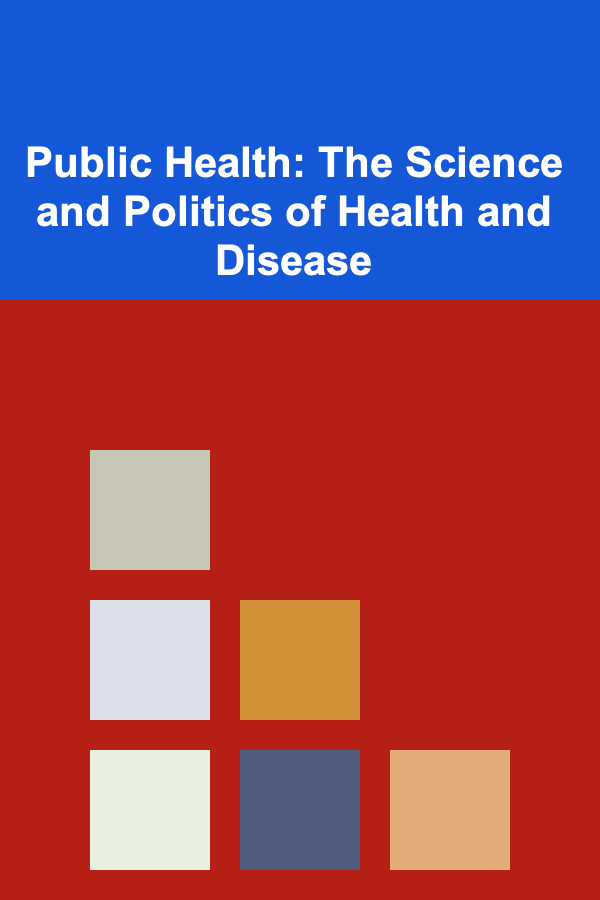
Public Health: The Science and Politics of Health and Disease
ebook include PDF & Audio bundle (Micro Guide)
$12.99$9.99
Limited Time Offer! Order within the next:

Public health is a field that lies at the intersection of science and politics, where research, policy, and advocacy converge to address health issues on a population level. It involves a wide range of activities aimed at improving and protecting the health of communities through prevention, education, research, and policy interventions. While public health is deeply rooted in scientific evidence, it also intersects with political considerations that shape health outcomes and access to care. In this guide, we will explore the scientific and political dimensions of public health, how they influence each other, and what actions can be taken to improve population health.
The Science of Public Health
The science of public health is grounded in the study of epidemiology, biology, and environmental science. Its primary goal is to understand the factors that influence the health of populations and use that knowledge to prevent disease and promote well-being.
Epidemiology: Tracking Health and Disease
Epidemiology is the cornerstone of public health science. It involves the study of how diseases spread, the causes of diseases, and the social, environmental, and genetic factors that influence health outcomes. Epidemiologists track disease patterns across populations, identify risk factors, and design strategies for disease prevention and control.
For example, during the COVID-19 pandemic, epidemiologists studied the spread of the virus, identified high-risk populations, and provided data to inform public health interventions like social distancing and vaccination campaigns. Epidemiological studies not only help to understand how diseases spread, but they also inform public health policies aimed at minimizing exposure and mitigating risks.
Social Determinants of Health
While genetic and biological factors play a role in individual health, the social and environmental conditions in which people live have an enormous impact on health outcomes. The World Health Organization (WHO) identifies key social determinants of health, including income, education, employment, social support networks, and access to healthcare. Public health scientists work to identify and address these determinants to reduce health disparities among different groups.
For instance, people in lower-income neighborhoods may have limited access to healthcare, healthy food, or safe environments, leading to higher rates of chronic diseases like diabetes, hypertension, and heart disease. Public health initiatives focus on addressing these disparities by promoting policies that improve access to resources and reduce inequality.
The Role of Environmental Health
Environmental health is another key area of public health science. It focuses on how environmental factors---such as air and water quality, exposure to chemicals, and climate change---affect human health. Public health scientists work to assess the risks associated with environmental hazards and advocate for policies that protect communities from harmful exposures.
For example, public health efforts have led to the reduction of lead exposure in drinking water, the banning of harmful pesticides, and the regulation of air pollution. These interventions have resulted in significant improvements in public health outcomes, particularly for vulnerable populations like children and the elderly.
Behavioral Health and Health Promotion
Behavioral health science looks at how individual behaviors, such as smoking, alcohol consumption, and physical activity, affect health outcomes. Public health scientists use this knowledge to design health promotion campaigns aimed at changing unhealthy behaviors and encouraging healthier lifestyles.
The success of initiatives like anti-smoking campaigns, seatbelt laws, and public health education programs to promote exercise and healthy eating can be attributed to behavioral health research. Understanding how to motivate individuals to make healthier choices is essential for preventing chronic diseases and improving overall population health.
The Politics of Public Health
While the science of public health provides evidence-based recommendations, the politics of health and disease often shape how these recommendations are implemented and which issues are prioritized. Political ideologies, economic interests, and power dynamics influence public health policies and can determine which populations have access to resources, care, and health protection.
Public Health Policy and Government Intervention
Governments play a crucial role in public health, from funding research and providing healthcare to regulating industries and ensuring access to essential services. Public health policies, including laws, regulations, and programs, are often shaped by political ideologies, public opinion, and lobbying from various interest groups.
For example, the Affordable Care Act (ACA) in the United States represented a major political decision aimed at expanding healthcare coverage to millions of uninsured Americans. Its passage was deeply influenced by political considerations, with strong debates surrounding issues like government involvement in healthcare, individual responsibility, and the role of private insurance companies. The success or failure of such policies can have profound implications for population health.
Health Inequities and Political Decision-Making
Political decisions often have direct consequences for health inequities. Policies related to income distribution, housing, education, and employment have far-reaching effects on the health of individuals and communities. In many countries, marginalized populations, including racial and ethnic minorities, immigrants, and low-income individuals, face barriers to accessing quality healthcare and other health resources.
For instance, policies that fail to address these inequalities---such as inadequate funding for healthcare in disadvantaged areas or discriminatory practices within healthcare systems---can exacerbate existing health disparities. Public health advocacy is essential in raising awareness about these inequities and pushing for policies that ensure equal access to care and health resources for all populations.
Political Influence on Public Health Crises
During public health crises like pandemics, the political landscape can significantly influence the response to the crisis. The allocation of resources, the speed of response, and the effectiveness of communication are often shaped by political leaders' decisions. Misinformation, political polarization, and inadequate government response can prolong the crisis and result in preventable deaths and suffering.
The COVID-19 pandemic is a prime example of how political considerations can impact public health outcomes. Disagreements over mask mandates, vaccine distribution, and lockdown measures led to significant political and social division, which, in turn, hampered efforts to control the virus and mitigate its effects. In contrast, countries that were able to implement swift, coordinated responses, guided by scientific evidence, tended to have better health outcomes.
Lobbying and Industry Influence
The politics of public health is also shaped by powerful interest groups, such as the pharmaceutical industry, tobacco companies, and food corporations. These groups often use lobbying and financial influence to sway public policy in ways that benefit their bottom line, sometimes at the expense of public health.
For example, tobacco companies have historically spent vast sums of money lobbying against smoking regulations, despite overwhelming scientific evidence about the dangers of smoking. Similarly, the food industry has been accused of influencing policy decisions related to nutrition labeling, food safety, and advertising, often leading to policies that are not aligned with the best interests of public health.
Bridging the Gap: Actions to Improve Public Health
Despite the challenges posed by the intersection of science and politics in public health, there are concrete actions that individuals, communities, and governments can take to improve public health outcomes.
1. Promote Evidence-Based Policies
Governments should prioritize evidence-based policies that are grounded in scientific research and data. Policymakers should consult with public health experts and use epidemiological data to inform decisions that impact population health.
2. Advocate for Health Equity
Public health advocates must work to ensure that policies address health disparities and promote access to care for marginalized populations. This includes advocating for policies that improve access to healthcare, housing, education, and economic opportunities for vulnerable groups.
3. Strengthen Public Health Infrastructure
Investing in public health infrastructure---such as disease surveillance systems, public health education, and healthcare accessibility---is critical for addressing both everyday health needs and emergency situations like pandemics.
4. Foster Public Engagement and Awareness
Public health campaigns should engage communities directly to raise awareness about health risks and promote healthy behaviors. Public health agencies should also work to combat misinformation and ensure that accurate health information reaches the public.
5. Address Environmental and Behavioral Health
Environmental regulations that protect air, water, and food quality should be strengthened, and public health campaigns should focus on promoting healthier lifestyle choices, such as exercise, diet, and mental well-being.
6. Build Multisectoral Partnerships
Public health issues are multifaceted and require collaboration across sectors. Governments, non-governmental organizations, the private sector, and communities must work together to address complex health challenges. Public health solutions are more likely to succeed when they are inclusive and consider the broader social, economic, and political context.
Conclusion
Public health is a dynamic field that combines rigorous scientific research with the complex realities of political decision-making. The science of public health provides us with the tools to understand and prevent disease, while politics shapes the policies and decisions that determine how these tools are used. By fostering collaboration between scientists, policymakers, and communities, we can create a more equitable and healthy society, where the benefits of public health advancements are accessible to all. Addressing the political and scientific aspects of public health requires constant vigilance, advocacy, and a commitment to evidence-based decision-making, but the potential to improve global health is immense.

How to Build a Family Lego Village for Creativity and Bonding
Read More
How to Create a Soundproof Baby Nursery for a Quieter Sleep
Read More
How to Maintain Your Home's Paint and Exterior Finish
Read More
How to Make a Checklist for Preparing Your Resume and Portfolio for Interviews
Read More
How to Protect Your Rental Property from Seasonal Damage
Read More
How to Use Airtight Containers to Extend Shelf Life
Read MoreOther Products

How to Build a Family Lego Village for Creativity and Bonding
Read More
How to Create a Soundproof Baby Nursery for a Quieter Sleep
Read More
How to Maintain Your Home's Paint and Exterior Finish
Read More
How to Make a Checklist for Preparing Your Resume and Portfolio for Interviews
Read More
How to Protect Your Rental Property from Seasonal Damage
Read More